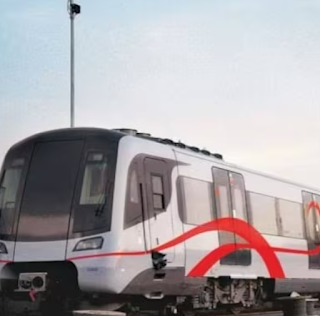The Delhi Metro Rail Corporation (DMRC) is gearing up to launch the Airport Express Line, which will see an increase in its operating speed from 90 kilometres per hour (KMPH) to 120 KMPH, starting from September 17. This significant speed enhancement has been achieved through careful planning and timely execution by DMRC engineers.
To achieve this remarkable feat, more than 2.6 lakh tension clamps have been replaced along the entire corridor, with the majority of the work carried out during night hours between 11 p.m. and 7 a.m. to minimize disruptions to regular services. This demanding task involved deploying over 100 workers simultaneously.
Before commencing the project, the effectiveness of these clamps was rigorously tested on a one-kilometre trial track, utilizing advanced instruments to measure various parameters, including rail vibrations and stresses.
Despite an estimated project timeline of 18 months, DMRC managed to complete the task in just six months, showcasing their efficiency and dedication. To ensure the safe operation of the system at higher speeds, a sophisticated monitoring system, incorporating 3D accelerometers and strain sensors, was deployed for continuous measurement of vibrations and strains on the tracks. This allowed for oscillation monitoring across speeds ranging from 90 kmph to 120 kmph.
Data collected at various speeds was carefully analyzed to comprehend the system's behaviour and response. Additionally, all software and safety certifications for the main system and subsystems were verified at an increased speed. Rigorous checks were conducted, including interface testing with rolling stock and passenger information systems.
The functioning of the Passenger Screen Doors (PSDs) in coordination with train movement was examined, and extensive testing of all signalling equipment was carried out. Modifications to the Over Head Equipment (OHE) system were made during non-revenue hours to accommodate train movement at 120 kph.
The operational speed of Metro trains on the Airport Express Line gradually increased from 90 kmph to 100 kmph on March 22, and further to 110 kmph on June 22. With safety certification received earlier this month, the speed will now reach 120 kmph from tomorrow.
This speed enhancement is expected to significantly reduce travel times for passengers. For instance, the journey from New Delhi to Yashobhoomi Dwarka Sector-25 will now take approximately 21 minutes. Travel time between New Delhi and Dwarka Sector – 21 has been reduced from 22 minutes to around 19 minutes, offering commuters a time-saving of 3 minutes. Similarly, the approximate travel time between New Delhi and Terminal – 3 Airport will be about 15 minutes and 30 seconds, down from over 18 minutes previously. This development is set to make commuting faster and more efficient for the public.



